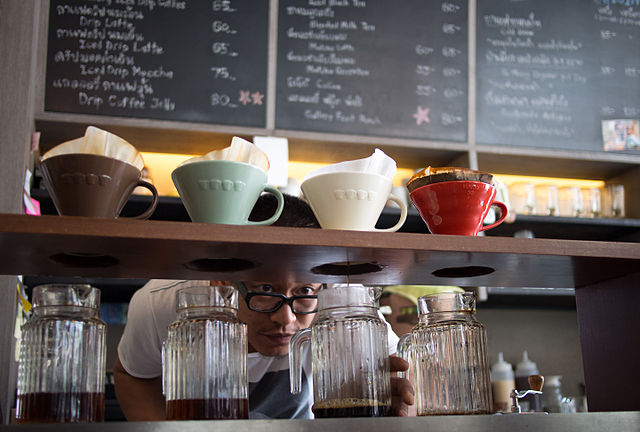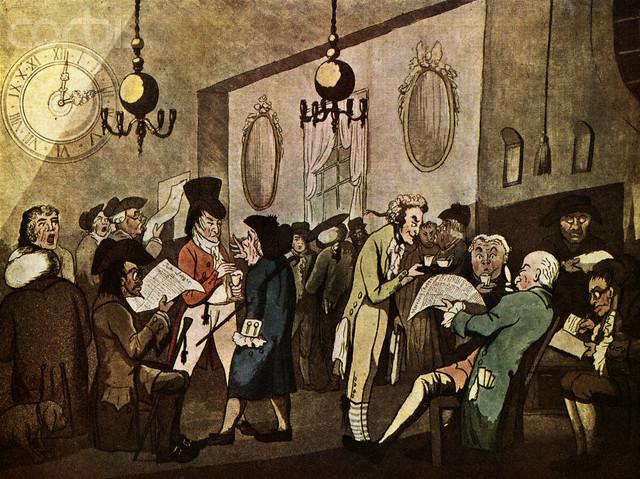A book newly acquired by the Thammasat University Libraries explains how coffeehouses may have historical and sociological importance in a nation’s development, beyond just being a place where people buy tasty beverages. The Coffee House of Lahore: a Memoir 1942-57 was generously donated to the TU Libraries by the Embassy of Pakistan in the Kingdom of Thailand, coordinated by Khun Imran Shauket, Goodwill Ambassador of the Alhamra. The book is shelved in the Pakistan Corner of the Pridi Banomyong Library, Tha Prachan campus. Its author is Khursheed Kamal Aziz (1927-2009), an eminent historian of Pakistan. After studies at the Government College, Lahore, Pakistan, Professor Aziz taught at Cambridge, Oxford, Manchester, Hull, Newcastle-upon-Tyne, Geneva, and Heidelberg universities, among others. Among his many significant works are Comparative Constitutions (1962), Britain and Muslim India (1963), The Making of Pakistan: A Study in Nationalism (1967), British in India: A Study in Imperialism (1976), Muslims under Congress Rule, 1937-1939, 2 vol. (1979), The Murder of History: A Critique of History Textbooks used in Pakistan (1993), The Pakistani Historian (1993), and The Meaning of Islamic Art (2004). Unlike some of these documented works of research, The Coffee House of Lahore is a more personalized and informal account of his friends and acquaintances, although his historical expertise adds to its value. It is written in a plain and candid style. The Coffee House of Lahore is about a meeting place that has been called a glorious nursery of ideas. As Professor Aziz noted:
Whenever an intellectual, cultural and literary history of Lahore (or the Punjab and Pakistan) is written, the diverse circles which met and discoursed in the Coffee House will have to be described in detail and the ever-widening waves of their influence recorded… Like all civilized cities, Lahore provided a wide range of restaurants where people gathered for pleasure, social interaction and intellectual gossip… The Coffee House first opened its doors at the site of the later Pak Tea House. Then it shifted to the Mall near Delhi House and Alfred Building and stayed there till the end…The Coffee House was for over 30 years the single most important and influential mental powerhouse which moulded the lives and minds of a whole generation, and its legacy affected the careers of the succeeding generation.
In this way, a coffeehouse influenced the intellectual, cultural and literary history of Lahore and Pakistan. Among the authors who visited this coffeehouse were Saadat Hasan Manto and Faiz Ahmad Faiz, whose works have also been donated to the TU Libraries by Mr. Imran Khan and are shelved in the Pakistan Corner of the Pridi Banomyong Library.

Thailand and Coffeehouses
As students and ajarns in the field of sociology and social history know, the term coffee culture refers to an atmosphere or social behavior associated with drinking coffee in public. Coffeehouses have been popular since they were first established over 700 years ago in Turkey. In Western Europe and the Eastern Mediterranean, coffeehouses were sometimes artistic and intellectual centers. Also in the TU Libraries collection is a detailed historical study of the coffeehouses of Paris, France. People talk, read, and write in coffeehouses, making it possible for much creativity to occur. In the 1930s in the city of Lviv, western Ukraine, a group of talented mathematicians met regularly and worked at a coffeehouse known as the Scottish Café. There some legendary mathematicians, including Stanislaw Ulam, made their first discoveries. Philosophers also favored the Scottish Café.
Following this intellectual tradition, in recent decades Thailand has become aware that coffee is an important crop for the development of the Kingdom. As an article from last year in Chiang Mai Citylife notes, the Lanna Thai Coffee Hub was developed as a social alternative to opium growth in the North. Assistant Professor Dr. Yaowaluk Chanbang of the Faculty of Agriculture, Chiang Mai University, is director of the Lanna Thai Coffee Hub Project. As Assistant Professor Yaowaluk recalled, in the 1970s,
When His Majesty the late King [Rama IX] made the suggestion to try growing other crops, then coffee was seen as an attractive alternative,” continued Dr. Yaowaluk. “Coffee was something that could be stored and transported without losing its value. Though Thailand wasn’t a coffee drinking nation, sweetened coffee was gaining in popularity after being introduced following WWII. But the coffee was very expensive, leading to it being mixed with such ingredients as ground rice, corn and even tamarind seed, with sugar caramel and margarine used to enhance the colour and aroma.
Whereas at first coffee was not a popular drink in the Kingdom, now it is estimated that there are over a thousand coffee shops in Chiang Mai, Lamphun, Lampang and Mae Hong Son. As Thais and tourists drink more coffee in the Kingdom, they also support a social network in the North of crop replacement. The food bloggers who rate the top coffeehouses in Bangkok may not be primarily concerned about such matters, preferring to focus on what products taste the best in their opinion. Yet there is a wider significance to this progress in crop development. Last year, Chiang Mai Province launched a Lanna Thai Coffee Hub campaign to promote the production and sales of quality coffee beans in environmentally-friendly plantations. The Lanna Thai Coffee Hub has encouraged extensive academic research. Theses at Chiang Mai University and research done by the Royal Project Foundation to increase knowledge and technical skills are among the results. Some of the leading studies are Coffee Milling Management in Arabica Coffee Blends in the Northern Region: A Comprehensive Research Report; Acceptance of Arabica Coffee Growing Technique by Growers in Amphoe Chiang Dao, Chiang Mai Province; Analysis of a Fresh Coffee Shop in Chiang Mai; Factors Influencing the Management of Coffee Plantations According to the Academic Principles of Coffee Growers Promoted by the Royal Project Foundation: the Complete Research Report; Designing Internet Direct mail for Marketing Promotion in Small Cafes in Amphoe Muang, Chiangmai Province; Factors Affecting Coffee Shop Operators in Muang District, Chiang Mai; Factors Affecting Good Agricultural Practices Appropriateness of Coffee Growers in Pa Pue Sub-district, Mae Taeng District, Chiang Mai Province; Factors Affecting Coffee Shop Owners in Nakhon Nayok Province; Consumer Consumption of Fresh Coffee in Amphoe Mueang, Nakhon Sawan; Customer Satisfaction on Service Marketing Mix of Fang Coffee Shop In Chiang Mai; Consumer Behavior in Using Fresh Coffee in Thonburi, Bangkok; and other related studies. These advances show that in the Kingdom, coffee and coffeehouses are seen as a key to social and financial development. When students and ajarns sip on their morning caffeine, they are participating in a small way in the progress of the nation.

(All images courtesy of Wikimedia Commons)

